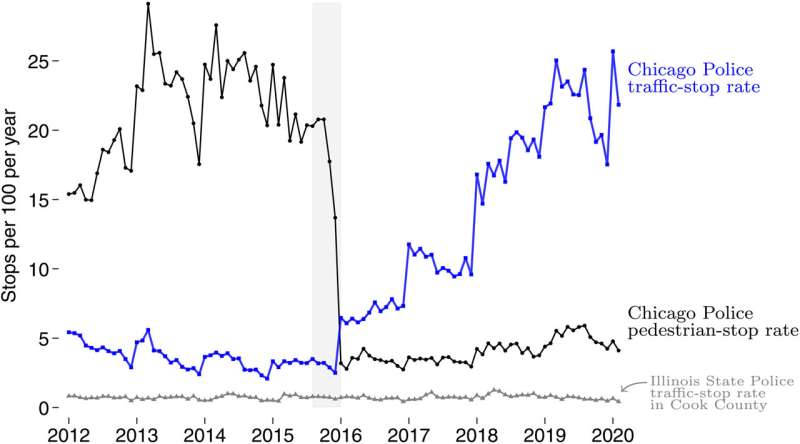October 2, 2023 report
This article has been reviewed according to Science X's editorial process and policies. Editors have highlighted the following attributes while ensuring the content's credibility:
fact-checked
peer-reviewed publication
trusted source
proofread
End of stop-and-frisk practice in Chicago led to increase in minority traffic stops, research suggests

A pair of civil rights researchers with the University of California has found evidence suggesting that ceasing one practice that violated citizen rights in Chicago may have led to the initiation of another. In their paper published in the journal Science Advances, David Hausman and Dorothy Kronick describe how they analyzed traffic and pedestrian stops in Chicago following new rules that made it much more difficult for police officers to conduct stop-and-frisk searches in the city.
Over the past several decades, civil rights activists across the United States have been highlighting various behaviors by government officials, average citizens, and especially police officers that violate the civil rights of minorities. One such behavior, dubbed stop-and-frisk, was where police officers could stop any person they came across and frisk them, ostensibly for weapons, but oftentimes for drugs as well. It was noted that most such stops involved minorities.
In such cases, police were allowed to conduct such searches whenever they had "reasonable suspicion" of a weapon. Then, in 2013, a federal judge ruled that such actions by officers working for the New York Police Department were unconstitutional. That led police departments across the U.S. to change such practices, including the Chicago Police Department. Officials there changed the rules and began forcing police officers to produce extensive evidence to backup up reasonable suspicion on such stops, which led to a steep decline in such searches.
In this new effort, the researchers wondered if the CPD had found other ways to achieve roughly the same results using other practices. To find out, they obtained and analyzed records from the Illinois Department of Transportation that listed pedestrian and traffic stops by police officers throughout the state, which included Chicago.
In looking at the data, the research pair found that stop-and-frisk procedures had dropped dramatically in Chicago starting in January of 2016, when the new rules came into effect—from 20 per 100 citizens to just 4 in 100. They noted that the rate remained low through 2019, the duration of the study period. But they also noted that traffic stops in Chicago increased from an average of 3.2 to 22 stops per 100 citizens over the same time period.
The researchers also noted that such stops occurred much more often with minority drivers and in the same neighborhoods where stop-and-frisk searches had been reduced. The research pair acknowledge that they found no direct evidence linking the two behaviors, but suggest it appears likely that there is a connection between them.
More information: David Hausman et al, The illusory end of stop and frisk in Chicago?, Science Advances (2023). DOI: 10.1126/sciadv.adh3017
Journal information: Science Advances
© 2023 Science X Network



















